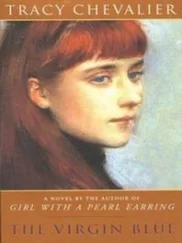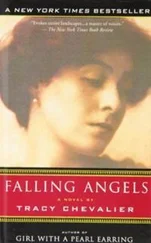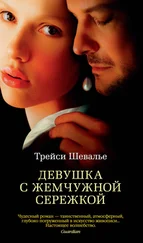Though warm enough in the afternoons, the sun was at a slant now, radiating a golden rather than a white heat. September always felt like a turning point to James, when the ease of the summer must be replaced by hard work and a gearing up to survive the winter. It was a matter of measurement. Were there enough oats and corn and hay to feed the animals for a year? Was the pig fat enough to slaughter soon? Had the garden produced enough to see the Goodenoughs through to the next growing season? He was always anxious until the barn was full, the pantry was full, the cellar was full. And they were not always full at the end of the harvest. The Black Swamp was fickle land: too wet, or too dry, or too rotten, or too dead. It was too unpredictable to guarantee a good crop.
Once he was able to walk further, there was a lot for him to catch up on. He needed to go to the barn to look in on the animals and see that John Day had brought in the hay all right, and check on the kitchen garden. The last of the corn needed bringing in: he should at least inspect the field even if he couldn’t help yet.
James should have concerned himself with his corn, his vegetables, his pigs. They were where he should have focused what little energy he had. Instead he went to see his apple trees-stopping twice to rest and joined midway by his youngest son shadowing him again.
To James an orchard in September was at its climax. The whole cycle of an apple tree-the sap and leaves and blossoms-peaked in its fruit. As he stood with Robert on the edge of the orchard and looked at the Goodenough trees, he saw a field full of laden trees that could feed his family for months. He knew you could not eat fruit and nothing else, but if it were possible he would be content to eat only apples every day.
Most of the apples were not quite ready. They had grown to full size but were still green, with red creeping across here and there. James preferred them now, before they could be eaten, when they hung on the trees and promised much. It was like finding a wife but not yet marrying her-lusting after her and not knowing about her temper or her laziness or her roving eye. These apples might end up mushy and full of worm holes or as bruised windfalls only good for cooking-but they were not yet. On the trees, they were perfect.
The three Golden Pippin trees were particularly heavy with apples, and of the fifteen trees he and Robert had grafted in the spring, twelve had leaves on them and were thriving. The deer fences with their spikes had held up all summer and kept out the deer, and Sadie. In two or three years they would produce sweet apples.
The fifteen seedlings from John Chapman that spring were all growing in their own small nursery, and could be transplanted the following year when James had cleared land for them. After the harvest and before the ground froze he would make a start on it.
“Looks like we’ll reach fifty trees producing in a couple of years,” he said, aware that he had said this before but for once truly meaning it.
Robert nodded. “That’s good, Pa.”
“Yes. Then we’ll really be settled. All right, let’s give these a week, then we’ll pick them.”
The next day James felt well enough to work again, though he had to rest often. Sometimes his heart beat fast like a bird’s and he went to sit in the shade of an elm next to the field where he and Robert were bringing in the corn. Soon Caleb was able to join them, then Nathan. Sadie and Sal were the last to get up from their beds, leaving Martha the bulk of the cooking and cleaning. Her face was becoming more and more gaunt, with blue rings hooking under her eyes and a vertical frown line growing between her eyebrows that should not be seen on a young girl’s face.
One evening James came back from the barn to find Sadie sitting on the bench outside the door, smoking a pipe in the late sun. She looked peaceful and rested and entirely clear of fever. There were no rings under her eyes, no frown line.
“Why aren’t you helping Martha?” he said. “She’s had enough to do looking after us all.”
Sadie leaned back against the house with her pipe between her teeth. “Ain’t that why we have children-to do our work for us?”
He did not even hesitate before slapping his wife. The pipe flew from her mouth and landed in a patch of dried grass, and James went to stamp it out to be sure it didn’t catch fire. When he turned back, Sadie was gone.
Inside she was not helping Martha. He could hear her up in the attic, getting into bed there. Martha did not look up from frying johnnycakes on the range. James was glad, for he did not want to see her frown line appear.

It suited me when he slapped me. I never felt easy when James and I was gettin along. Havin a common enemy like Hattie Day jest messed things up, put us on the same side and that didnt feel right. James hadnt been on my side since back in Connecticut. Maybe not even then.
Eventually I got bored pretendin to be sick. I made Sal get up too so I wouldnt have to face the little mouse in the kitchen alone. Cause I hated how without even sayin a word Martha made me feel like I was the worst mother ever in the world. Which I probably was.
At first I was weak as a rag doll so I did my work sittin at the table, let Martha do the fetchin and the stirrin. Thats why I didnt see the jar of pickled eggs for a few days. Then one day I went back in the pantry lookin for some cucumbers to set out with the bread and cheese and lettuce and tomaters. There were three jars of pickled eggs on the shelf, and one of them was colored pink. I brought the jar back with me and set it on the table. Whats this, I said to the little mouse.
She was mendin the nine-patch quilt and looked up all fearful the way she always did. Pickled eggs, Ma.
I know what they are. Whyre they pink?
Martha cleared her throat like maybe that would make a different answer come out. That was from the beet Mrs. Day put in to make it colored that way, she said.
I told you I didnt want colored water. I know you heard me say that.
Martha didnt make even the tiniest squeak. She tried to go back to her sewin but her hands were trembling so much she couldnt hold the needle. So she set it down and went to tuck her hair behind her ears.
Dont you touch your goddamn hair. Whyd you go against what I said?
Sorry, Ma, she said so quiet it was like she was hummin.
Sorry nothin. You like Mrs. Day better than me. Is that it?
No, Ma.
You want Hattie Day for your mother?
No, Ma.
I think you do. Maybe I should jest send you over there right now and be done with it. Let her dress you in one of them straw hats. Youd like that, wouldnt you.
No, Ma. The look on her face was a sight to see.
Then why did you do it when you know I didnt want my eggs sittin in pink water?
She didnt answer for a while. Then when she did I couldnt hear her. Whatd you say? I said.
I thought itd look pretty, she whispered. She was cryin by now.
Pretty? I laughed at that. You dont think its pretty enough around here? You dont think thats pretty? I pointed at the quilt in her lap. Martha had been fixin the tear down the middle but it still didnt look so good. What about my face? I added. Aint that pretty enough for you? Or Sal? Shes the good lookin one in the family.
Martha was fumbling with the quilt corner to dry her tears.
I didnt say anymore but kept gettin supper on the table. But as I was passin I let my elbow nudge the jar of eggs and it fell and smashed.
Oh dear, you better clean up that pretty mess, I said. Cause I sure as hell aint.

Once the corn was in, the apples were ready, apart from the three Golden Pippins, which needed a few more days. James had Robert and Martha and Sal to help pick them, while Caleb was digging up the garden and planting onions and cabbage. Nathan had gone back to bed with fever.
Читать дальше
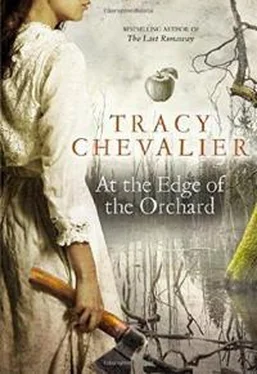



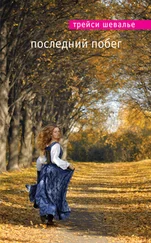

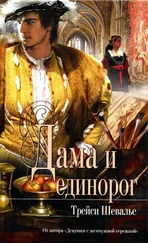
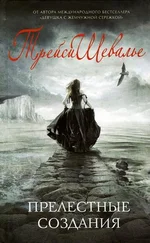
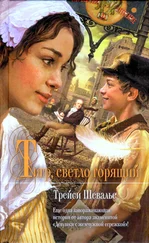
![Трейси Шевалье - Тонкая нить [Литрес]](/books/386177/trejsi-shevale-tonkaya-nit-litres-thumb.webp)
